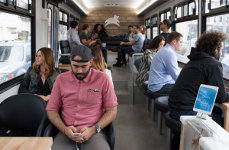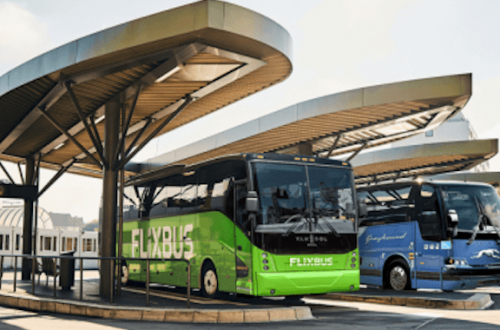 The transit service Leap, which was running local bus routes in San Francisco, was called the evolution of the bus industry by many. Leap is a local luxury bus service that is equipped with advanced technologies, such as Bluetooth check-in and bus tracking systems. Ever since it hit the market, the Leap Transit attracted numerous passengers due to its innovative design including a capacious lounge area, fine leather seats and wooden desks facing the windows.
The transit service Leap, which was running local bus routes in San Francisco, was called the evolution of the bus industry by many. Leap is a local luxury bus service that is equipped with advanced technologies, such as Bluetooth check-in and bus tracking systems. Ever since it hit the market, the Leap Transit attracted numerous passengers due to its innovative design including a capacious lounge area, fine leather seats and wooden desks facing the windows.
For only $6, commuters could enjoy an inexpensive and convenient bus ride to work, order snacks and beverages like coffee and fresh juice on board with Leap’s exclusive smartphone app as well as work on their laptops with free Wi-Fi and USB interface on the way, feeling as comfortable as at home.
Leap gathered huge investments from some famous companies in Silicon Valley like Andreessen Horowitz and SV Angel. The establishment of Leap was considered an exemplary endeavor from which other bus companies like Greyhound Bus, which provide travel services between cities across the US, could learn in order to highten the level of comfort on board.
Nevertheless, the start-up has declared bankruptcy on July 15 this year, leaving all of its buses on auction, starting at $5 each. The company initially discontinued part of its services in May after the city supervisors took issue with its operating license, which led to the auction of its two buses in June and official bankruptcy later on. So far there are only two more buses left, waiting for sale in October.
Luxury bus companies like Leap have been a disputable topic for quite a long time in the US bus market. City regulators and dissenting voices fear that rise of the luxury bus service will cause extra burden for the currently well developed transit system in the city, criticizes San Francisco Supervisor John Avalos in an interview. He condemns Leap for creating a business model, of which mainly the tech workers are in favor.
“We have tried to design an experience that takes the hassle out of commuting, and part of that is not having a crowded space”. The founder of Leap Kyle Kirchhoff expressed his disagreement in response to the widespread criticism. He believes the initial purpose of the concept was to benefit a large crowd of commuters in San Francisco instead of serving a small group of customers. Supporters also argue the increase of local bus connections will overall benefit citizens in San Francisco.
The company’s failure has become a heated debate in the US bus market recently. No matter what the result is, the former star favored by Silicon Valley definitely will provide some profound insight to the future development of the whole bus industry.
Share this post:

